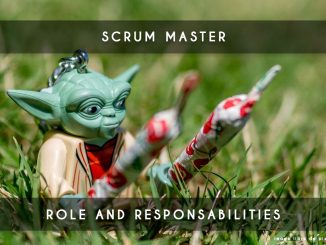
In Scrum, we have 3 different scrum roles which have different responsibilities: scrum master, product owner and development team. This share of responsibilities will allow delivering quality products. Let’s explore these different roles and their interactions.
Scrum significantly diverges from traditional project management methodologies like waterfall or the v-model. The framework proposes only 3 distinct roles to share all the necessary responsibilities. However, in Scrum, the entire team is responsible for the quality of the product.
Scrum Roles
As mentioned earlier, Scrum introduces three pivotal roles that collaborate synergistically to meet customer expectations:

Product Owner
The Product Owner shoulders the pivotal responsibility of managing the product backlog, encompassing a range of tasks:
- Write the product backlog items (often user stories) in a common language
- Order the product backlog items according to customer needs and their perceived value
- Be transparent with the product backlog and the strategy
- Have the authority to cancel a sprint if the sprint’s objective is unreachable
It’s crucial to clarify that the Product Owner is not tasked with personally evaluating the development team’s work. To delve deeper into these responsibilities, refer to the comprehensive article on Product Owner Responsibilities.
Scrum Master
The Scrum Master acts as the custodian of the process, assuming the following responsibilities:
- Guide the team and the organization in adopting and assimilating Scrum practices
- Coach both the Product Owner and the Development Team to optimize their performance
- Facilitate improved communication and interaction among team members
Distinguishing the Scrum Master’s role from that of a conventional manager or project manager is crucial. It’s akin to a servant-leader position, primarily focused on empowering the team’s journey of continuous improvement. Gain deeper insights into these responsibilities through the comprehensive article on Scrum Master Responsibilities.
Development Team
The Development Team comprises 3 to 9 individuals, harboring the expertise required to create and deliver the product. This team extends beyond developers, encapsulating diverse skills. Notably, the Development Team is accountable for testing their own work.
- Self-organization and cross-functionality
- Exclusive authority over modifying the sprint backlog (without the involvement of the Product Owner)
- Equal responsibility shared among all team members, devoid of hierarchical titles
- Absence of sub-teams within the Development Team
For instance, a member proficient in testing does not serve solely as the “tester” but rather contributes testing expertise within the team. Decisions related to product development rely on item specifications rather than external directives.
Useful link about these Scrum roles: Development Team (in French)
This article was provided in collaboration with My Agile Partner.




Be the first to comment